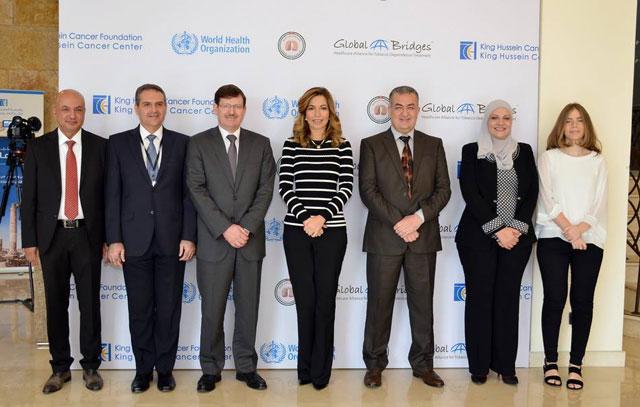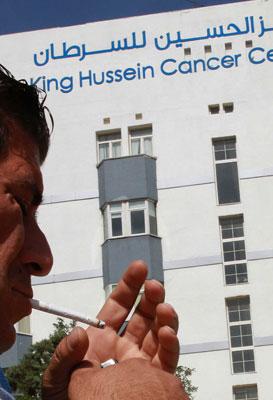You are here
KHCC launches regional summit on tobacco dependence
By Ahmed Bani Mustafa - Nov 05,2017 - Last updated at Nov 05,2017

HRH Princess Ghida Talal poses for a group photo with participants at the 1st East Mediterranean Summit on Tobacco Dependence Treatment in Amman on Sunday (Photo courtesy of Princess Ghida Talal’s Facebook page)
AMMAN — King Hussein Cancer Centre (KHCC) on Sunday launched the 1st East Mediterranean Summit on Tobacco Dependence Treatment (TDT) in Amman.
Some 300 healthcare providers from 15 countries from across the region are taking part in the two-day event, a KHCC statement said.
The summit will host key regional and international speakers, who have had an influence in developing and strengthening TDT around the world, according to the statement.
The event aims to address several relevant issues including the supply and demand for TDT services, the role of TDT in non-communicable diseases, behavioural interventions and medications used in TDT, in addition to the opportunities for research in the region.
The summit came as a collaborative effort by KHCC, the World Health Organisation, Global Bridges and the Jordanian Thoracic Society.
During the opening ceremony, HRH Princess Ghida Talal, chairperson of the KHCC and Foundation, said that “despite the painful history of smoking and its control over successive generations, I believe that the solutions exist, that our motivation is strong and that we must take the decision to eliminate the phenomenon of smoking and addiction.”
KHCC Director General Asem Mansour said that the conference, which is the “first of its kind” in the region, is an opportunity for exchanging expertise among stakeholders from various countries and local health sectors.
President of the summit and director of the Cancer Control Office at KHCC, Firas Hawari, said that the event is an outcome of the cooperation between various domestic and international bodies, noting that the event comes as one of the most important international policies of combating tobacco.
For her part, Judith Mackay, director of the Asian Consultancy on Tobacco Control, said that the conference is a great opportunity for Jordan and the region to exchange expertise and develop TDT.
Mackay told The Jordan Times that the conference focused on methods known for reducing the use of tobacco such as taxation and price, which protect young people aged from 11 to 22 years from smoking.
It also focused on the packaging of tobacco, which plays a great role in reducing smoking rates, including the pictorial warnings and the reduction of space to be used by the tobacco industry to advertise its products, Mackay said.
The senior advisor emphasised the importance of focusing on health education for adolescents on diseases and illnesses caused by tobacco.
She stressed the need to enforce the Public Health Law, noting that Amman will become a smoking-free city as part of an international programme, starting with the government’s departments.
Taylor Hays, a professor of medicine at the Mayo Clinic College of Medicine, told The Jordan Times that the policies implemented to help populations reduce their smoking are “effective” and make people more likely to want to quit, referring to the high prices and interdiction to smoke indoors as an example.
“If the government applies these policies, then we also need to provide smokers with health treatment to help them quit smoking through TDT,” Hays said.
Jordan has a growing number of opportunities for people to be treated for tobacco dependence and the conference itself, with the number of attendants, is an example of what Jordan can do in this field, the professor added.
He commended KHCC for training more cadres on TDT, noting that physicians, hospitals and clinics should also make TDT part of their care system to provide an easier access for those seeking to quit.
KHCC said that lung cancer, highly related to smoking practices, is among the top five cancers in the Kingdom.
According to the Department of Statistics (DoS), Jordanians spent JD602 million on tobacco products in 2013, with the average annual family expenditure standing at JD480.10.
The department noted that the larger the family is, the more it spends on smoking. Families with one to two members spent 2.8 per cent of their income on smoking, whereas the ratio reached 4.2 per cent for families of three to four.
Additionally, according to a DoS report in 2011, 72 per cent of Jordanian families had not heard about passive smoking.
Related Articles
The King Hussein Cancer Centre (KHCC) on Monday released the first Arabic language comprehensive Jordanian Guideline for tobacco dependence treatment (TDT).
AMMAN — Yazeed was 12 years old when he had his first shisha, an instrument for vaporising and smoking flavoured tobacco.
AMMAN — The King Hussein Cancer Centre (KHCC) has recently concluded a training workshop on tobacco dependence treatment (TDT) that lasted f

















